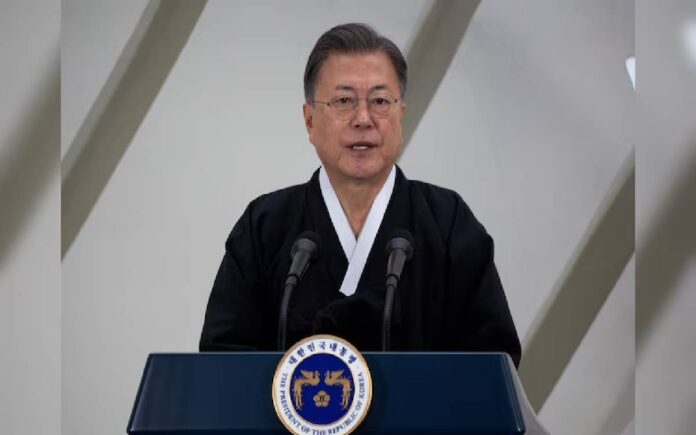Seoul: In a dramatic development that could reshape South Korea’s political landscape ahead of the June 3 presidential election, former President Moon Jae-in has been formally indicted on bribery charges, prosecutors announced Thursday.
Moon, who served as president from 2017 to 2022, stands accused of receiving bribes totaling 217 million won (approximately €133,239) through illicit favors allegedly funneled via a no-show job arranged for his then-son-in-law during his tenure.
Allegations Tied to Eastar Jet Founder
The charges center around Lee Sang-jik, the founder of Thai airline Eastar Jet and a former political associate of Moon. Prosecutors claim Lee provided Moon’s son-in-law with financial benefits—including wages, housing, and other support—from 2018 to 2020, despite the individual lacking any relevant aviation experience.
Moon’s son-in-law was reportedly appointed to a director-level position in Lee’s Thailand-based airline. However, prosecutors assert that he performed only minimal duties while working remotely from South Korea, effectively making it a no-show job.
Both Moon and Lee have been indicted for bribery, with Lee additionally charged with breach of trust.
Political Implications and Reactions
Though the investigation found no direct evidence linking Moon to Lee’s subsequent political appointments—including a nomination for parliament and a top role at a state-funded agency—the indictment has already intensified partisan tensions in an already turbulent election season.
Moon’s allies in the Democratic Party have swiftly condemned the charges as politically driven, suggesting they are part of a broader campaign by prosecutors aligned with conservative factions to undermine Moon’s legacy and discredit liberal candidates.
“This is nothing but political retribution” ,one Democratic Party spokesperson said, accusing the current administration of weaponizing the judiciary.
The case comes shortly after the ouster of conservative President Yoon Suk Yeol, who now faces trial himself over alleged attempts to impose martial law. The back-to-back scandals have plunged the South Korean political scene into turmoil, just weeks before voters head to the polls.
A Legacy Under Scrutiny
Moon Jae-in, a former human rights lawyer and progressive icon, is best remembered for his historic outreach to North Korea. During his presidency, he met Kim Jong-un three times, helping pave the way for the high-profile summit diplomacy between North Korea and then-U.S. President Donald Trump.
Supporters hail Moon’s efforts as a landmark shift in inter-Korean relations, noting he helped ease military tensions and initiated long-stalled peace talks. However, critics argue that Moon’s engagement policy was overly idealistic, allowing Pyongyang to gain time and continue expanding its nuclear arsenal under the cover of dialogue.
Election Outlook
Despite Moon’s indictment, liberal presidential candidate Lee Jae-myung remains a frontrunner in the polls, though he too is facing his own corruption trial, contributing to a fractured and volatile race. The ongoing legal battles have further polarized public opinion and raised questions about accountability, governance, and judicial independence in South Korea.
As the nation braces for one of its most contentious elections in recent history, the ripple effects of Moon’s indictment are sure to be felt across the political spectrum.



